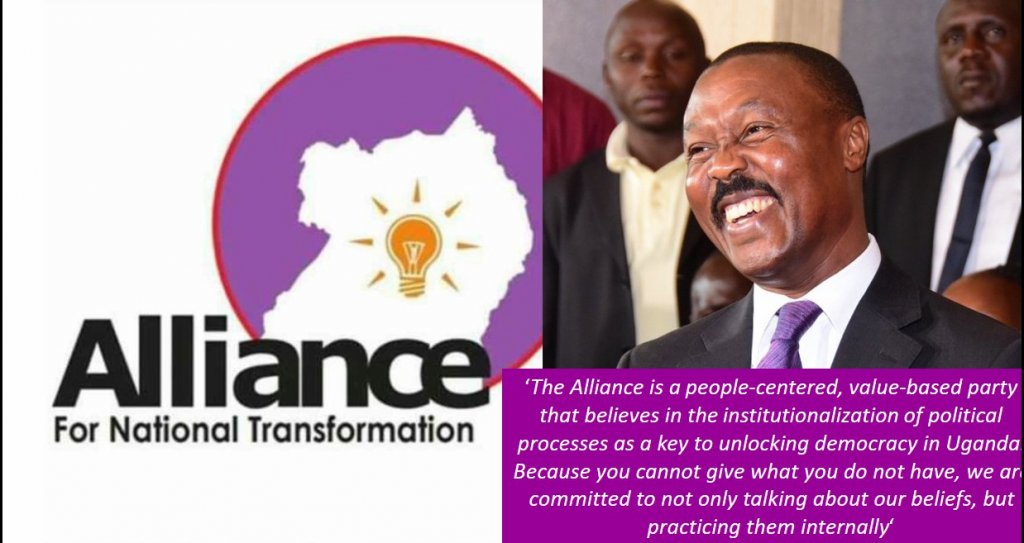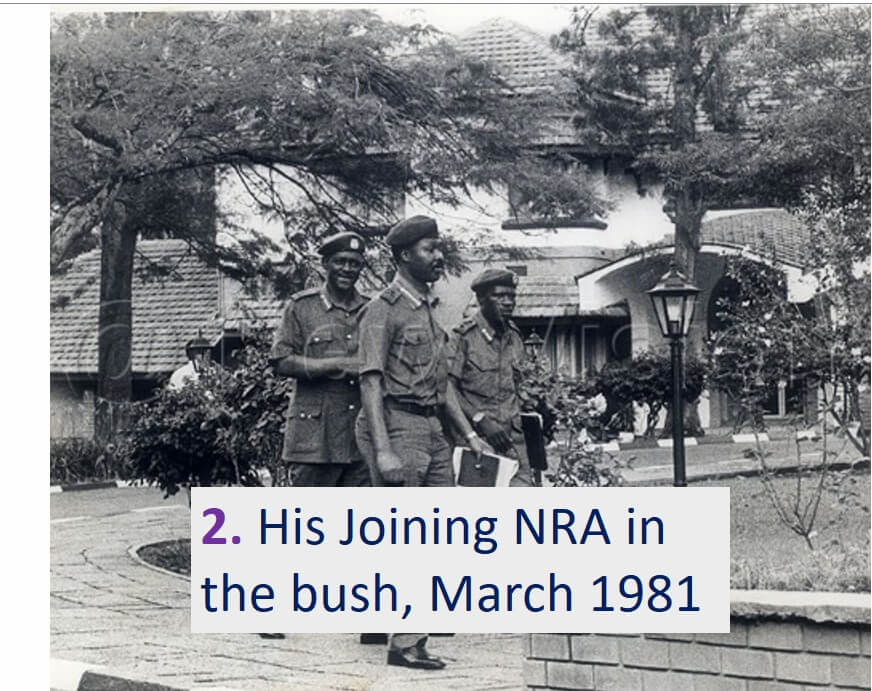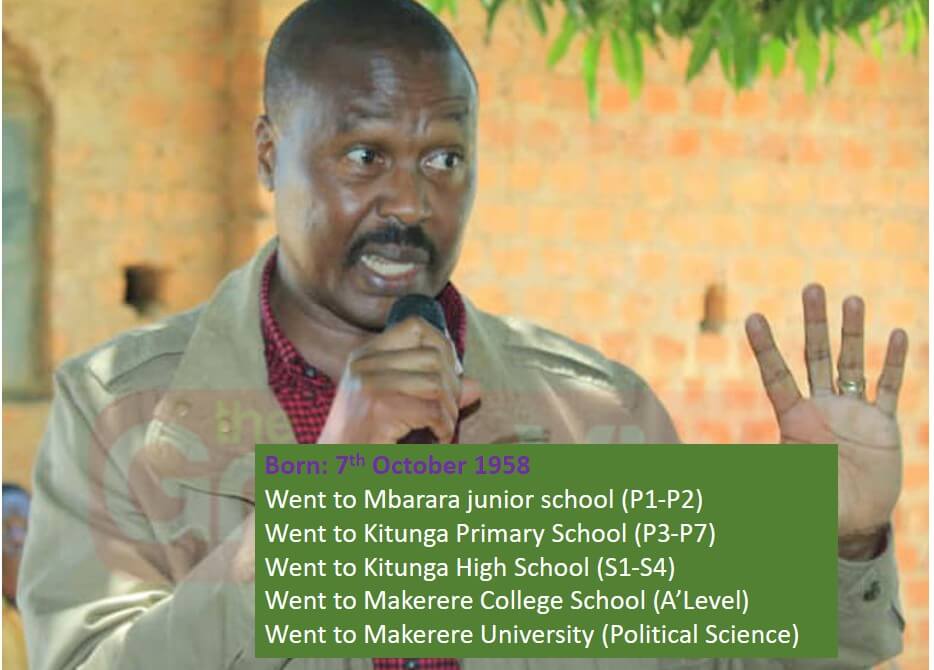Evidence Part 2: Is Mugisha Muntu Indeed the ‘Change You Can Trust’?
General Gregory Mugisha Muntu is one of the presidential aspirants in Uganda. He has successfully managed to position himself as the only ‘Change You Can Trust’. In our series, we are trying to analyze his past life, actions, and decisions and see if we can find traces of this trustworthiness. In our first part, we examined his early life, growth, and education. In that part, we realized that he was taught to be humble in his early years, a virtue he maintains up to today. We also realized that he was an exceptional students leader. Lastly, we found out that, despite all the pleasures he was exposed to and the political ideologies of his family, Muntu chose divergency for truth, justice, and values he stood for when he joined NRA guerilla war in 1981.

In today’s article, we want to deeply explore his life in NRA, during and after the war.
Mugisha Muntu Joins National Resistance Army, NRA, 31st March 1981
During his time at the university (1979-1981), Muntu woke up from political slamber! The man who had grown from a family of UPC people started re-thinking everything, including what his father believed in politically. According to an account written by Kiggundu Edris, at University, Muntu met guys like Kiiza Besigye, Henry Tumukunde, and Jim Muhwezi. With these guys, he started mobilizing against the unlawful killings by Amin’s regime, killings that Obote (1980-1985) maintained!
When he finished University in 1981, the man, instead of securing a great job (becoming an aide to president Milton Obote) through his ‘great UPC father’, joined Museveni’s guerilla war (since March 31st 1981)! This implies that his joining was purely value or principle-driven (otherwise, he had everything at home!).
READ THIS TOO: It is Cruel to Demand for Blood of Bobi Wine’s Children before you can believe him!
Few days into this new life, it is said, he was shot in the chest during one of their confrontations with government (Obote’s). He was later sneaked into hospital (Kiseka market health center) for treatment. When he got better, an opportunity he would have used to not return to the bush and, instead, go home, the principled soldier went back to the bush, securing more confidence and trust from the guerrilla war general, Museveni. He got promoted.
He was a Political Commissar in the rebel Mondlane Unit and was later made its Intelligence Officer (IO). He later became Kabarega Unit IO from where he was (in 1983) made Director of Civil Intelligence while Maj Gen Jim Muhwezi was Director of Military Intelligence.
In 1986, January 26th, NRA took over power in the famous 9 days war (17-26th January 1986), the Battle of Kampala. He later emerged as the head of Miltary Intelligence. In the Wikipedia’s account, it is said that he had Paul Kagame, the current president of Rwanda, under his command. In the following year, 1987, Muntu was sent to Russia for more training. When he returned, he was made the Chief Political Commissar, taking over from Amanya Mushega. From then, the young soldier never looked back. He confesses: ‘I was later made the Division commander of 5th Division in Lira from where I was appointed Army Commander later in 1989‘. In one account, his success is attributed to his loyalty and incorruptible service. From being Army Commander, Muntu was later promoted to the rank of Major General and appointed Army Commander (1989-1998).

After the 1995 constitution, NRA army was renamed UPDF, and Muntu’s position (Army Commander) became the ‘Chief of Defense forces of Uganda’. During Muntu’s reign as the Army chief, he disciplined the army to the core. Muntu was incorruptible, straight to the point and very indignant to any form of indiscipline. According to Muniini K. Mulela, he institutionalized the army, fought corruption, instilled professionalism, and remained Loyal to the presidency, not the president! According to Daily Monitor reporters, Irene Abalo Otto and Patience Ahimbisibwe, Muntu installed stabilization and demobilized about 50,000 personnel from Miltary service!
NB: In army, to demobilize is to ‘ stand down a nation’s armed forces from combat-ready status simply because of the victory in war, or because a crisis has been peacefully resolved and military force will not be necessary’. It can as well be because the said army officers no longer deserve to be in service.
READ THIS TOO: Is Mugisha Muntu the change you can trust part 1
Surprisingly, some sections of the army, chiefly led by Major General James Kazini accused Muntu of creating schism or division in the army by alienating the ‘uneducated’. However, a deeper examination of these accusations reveal nothing like that! On the contrary, his army disciplining efforts were supported by the president. It is important to note that Museveni (the president) loved James Kazini too; despite the general public complaints regarding the ‘unlearnedness’ of the general, Museveni kept promoting Kazini! Instead, a small wikipedia’s account of James Kazini’s life reveals him as a corrupt and unfaithful man, though with a fearless spirit during war! Therefore, it could be because he couldn’t tolerate impunity and crude methods in the army that some saw him as their ‘enemy’.
Along with his miltary duties, Muntu was a member of National Resistance Council (NRC), the first interim group of people that governed the country shortly after NRA takeover in 1986 (read more about NRC). This council, originally comprised of 38 historical diehards of NRA army, including some few men from UPC and DP, later instituted the Constitutional Commission Statute or Odoki Commission (1988) that was to draft a document to inform the 1995 constitution. In 1993, NRC instituted Constituent Assembly Statute, which saw the Constituent Assembly of 1994-1995, the assembly that designed Uganda’s constitution.
According to a Ugandan political author, James Katorobo, as cited by a report document by Human Rights Watch, Mugisha Muntu is the only NRC guy who opposed what the Odoki Commission had presented for constitution. Straight from the document:
“However, in what has been described as a rare democratic sentiment from a military source in Africa, the commander of the National Resistance Army, Major General Mugisha Muntu, chastised the members of the NRC for fearing to face the electorate, and called for a renewed mandate from the people prior to the adoption of the constitution.”
In light of how Mugisha presented himself during the constitution assembly, should we take this as his first official and public expression of his indignance to Museveni’s policies and where he was taking the country? Remember, the Odoki’s report and the general 1995 constitution consolidated much power to the president and restricted multi-party system. The human rights report document makes it plain: “Many of the debates which ultimately led to todays legal restrictions on civil and political rights took place in the Constituent Assembly in 1994-95“. In other words, Muntu was advocating for more ‘people power’ even when he was still the main man on the cake! Indeed, daily monitor reports:
‘His fallout with Museveni started around 1995 after his stint as a member of the Constituent Assembly which enacted the 1995 Constitution. They disagreed on the military and political approach, that saw his removal from military command and appointment as minister which he rejected, quit and went on to join the opposition‘.
Is Mugisha Muntu indeed the ‘change you can trust’? YES!

- For truth, justice, and values he stood for, Muntu joined NRA
- While many were suspicious of him (after all, he was from a UPC family), Muntu proved himself by working hard for NRA, including his return to the bush after the incident in which he was shot. This proved that he could be trusted.
- When he was army chief (1989-1998), he was an exceptional army leader with no single case of corruption, embezzlement, or indiscipline.
- When he sensed that his boss, Mr. Museveni was diverting from the cause, he declared his opposition publicly during the 1994-1995 constituent assembly. Indeed, Muntu says that he doesn’t like ‘going behind someone’s back’. When he agrees or disagrees, he declares it publicly.
- When he couldn’t take it anymore, the guy resigned, turning down all possible pleasures and offers, just for the values he stood for. He is the true change you can trust.
READ THIS TOO: 3 Reasons one might consider voting for Bobi Wine
In the next part, we will discuss his leaving NRA and joining opposition, FDC. For now, God Bless You.


